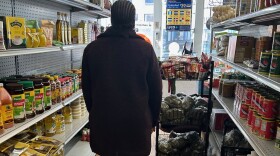Despite extensive efforts to save her, an eagle that ingested poison meant for rodents died at the Cape Wildlife Center in Barnstable this week.
The incident draws attention to the problem of controlling rodent populations while protecting wildlife and humans from unintentional poisoning.
The eagle, known as MK was found in Arlington in a weakened condition and rushed to the Cape facility, which is part of the New England Wildlife Center.
Staff at the Cape Wildlife Center were quickly able to determine that MK was affected by anticoagulant rodenticide, probably through eating a mouse or rat that had been poisoned.
Second generation anticoagulant rodenticides, known as SGAR, cause uncontrollable bleeding.
“Unfortunately it’s a common problem in an uncommon species,” New England Wildlife Center CEO Zak Mertz told CAI. “So, between our two hospitals, in Weymouth and Barnstable, we see between a hundred and 200 cases of anticoagulant rodenticide poisoning each year.”
Using anticoagulant poison on rodents is not illegal. The problem arises when animals, for which the poison was not intended, come into contact with it.
Mertz said anyone hiring a licensed pest disposal company should insist that they do not use second generation anticoagulant rodenticides.
“Just ask your pest control operator to stay away from SGAR, they’ll know what that means, and it will make sure that not only the animals you love in your back yard are safe, but also your kids, because anyone can get into this stuff and it’s pretty dangerous.”
Mertz said there are plenty of alternatives to SGAR.
“Look, we’ll probably all be in a position in our lifetimes where we have to control a mouse or rat problem to keep us and our family safe, but there are plenty of other options on the market whether they be deterrents or snap traps where they only affect one animal at a time.”
The Cape Wildlife Center chronicled its treatment of MK in social media posts, describing how the eagle began bleeding internally.
“Our veterinary team was by her side when it happened and was able to quickly clear her airway and intubate her, provide emergency drugs and fluids as her heart rate slowed and eventually worked to do compressions to revive her. Sadly it was not enough to bring her back. She was gone in a matter of minutes,” the post said.
MK was a well-known bird in Massachusetts, considered by many to be a symbol of the revitalization of the Mystic River watershed in the suburban Boston area.
MK was hatched in Waltham in 2016 and she and her mate KZ have attracted many fans. They were even the subjects of a children’s book, “KZ & MK, Lord and Lady of the Lakes: A True Story of the Mystic Lakes Bald Eagles,” by John Harrison and Kim Nagy with illustrations by Steve Gladstone.
Legislation filed at the statehouse would require the increased use of Integrated Pest Management, which includes things such as sealing building holes and cracks and removing nesting materials from problem areas to discourage rodents, rather than relying on poisons.
It would also require that public institutions of higher education to adopt IPM strategies.
The legislation also calls for digitization of pesticide use forms by pesticide dealers for better monitoring.





